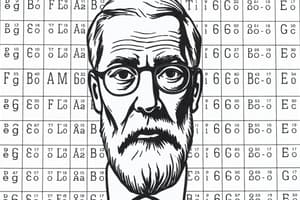Podcast
Questions and Answers
Who published a test to help place Paris schoolchildren in appropriate classes?
Who published a test to help place Paris schoolchildren in appropriate classes?
Alfred Binet
Psychological testing and assessment have origins in early twentieth-century Germany.
Psychological testing and assessment have origins in early twentieth-century Germany.
False (B)
What is the purpose of psychological assessment?
What is the purpose of psychological assessment?
- To restrict psychological evaluations
- To only test intelligence
- To conduct interviews with no evaluation
- To gather and integrate psychology-related data (correct)
What methods are used in psychological assessment?
What methods are used in psychological assessment?
During which world conflict did the military first require psychological tests to screen recruits?
During which world conflict did the military first require psychological tests to screen recruits?
The use of tests to evaluate abilities and skills relevant to success in a school context is known as __________ assessment.
The use of tests to evaluate abilities and skills relevant to success in a school context is known as __________ assessment.
Which type of assessment involves evaluating a person's psychological aspects as they existed prior to the assessment?
Which type of assessment involves evaluating a person's psychological aspects as they existed prior to the assessment?
What is ecological momentary assessment (EMA)?
What is ecological momentary assessment (EMA)?
Who might refer someone for a psychological assessment?
Who might refer someone for a psychological assessment?
Psychological testing involves measuring psychology-related variables without any standard procedures.
Psychological testing involves measuring psychology-related variables without any standard procedures.
What approach involves the assessor and assessee working as 'partners' during psychological assessment?
What approach involves the assessor and assessee working as 'partners' during psychological assessment?
Flashcards are hidden until you start studying
Study Notes
Historical Background of Psychological Testing
- Early roots trace back to twentieth-century France, notably through Alfred Binet's work in 1905.
- Binet created a test aimed at appropriately classifying Paris schoolchildren for education.
- An English version of Binet's test emerged within a decade for U.S. schools.
- The U.S. military implemented psychological testing during World War I to assess recruits rapidly for intellectual and emotional conditions.
- World War II saw an increased dependence on psychological tests for screening military personnel, leading to the development of diverse assessments measuring intelligence, personality, and various psychological and social factors.
Psychological Assessment
- Involves gathering and integrating psychology-related data to create evaluations through various methods, including tests, interviews, and observations.
- Aims to interpret and derive meaning from the information gathered about clients.
- Key tools for assessment include:
- Interviews
- Observations
- Questionnaires and surveys
- Review of records (Case History)
Psychological Testing
- The process entails measuring psychology-related variables through established methods to obtain behavior samples.
- Follows specific protocols outlined in manuals and involves designated time frames.
- Types of tests include:
- Personality Tests
- Neuropsychological Tests
Distinction: Testing vs. Assessment
- Testing focuses specifically on quantifying psychological variables, while assessment encompasses a broader evaluation integrating multiple data sources.
Varieties of Assessment
- Educational Assessment: Evaluates abilities and skills linked to success in academic settings.
- Retrospective Assessment: Analyzes psychological aspects of a person as they were at a previous point in time.
- Remote Assessment: Gathers data and conclusions about a subject not physically present with the evaluators.
- Ecological Momentary Assessment (EMA): Assesses cognitive and behavioral variables in real-time, location-specific contexts.
The Process of Assessment
- Begins with a referral from sources like teachers, psychologists, counselors, or HR specialists, addressing specific questions.
- Assessors may meet with the client or others before formal evaluation to clarify referral reasons.
- Involves selecting appropriate assessment tools before conducting formal evaluations.
- Findings are documented in a report tailored to answer the referral question, with potential feedback sessions scheduled afterward.
- Assessment approaches vary; some assessors work with minimal client input while others advocate for a more collaborative approach.
Collaborative and Therapeutic Assessments
- Collaborative Psychological Assessment: Involves a partnership between assessor and client from initial contact to final feedback.
- Therapeutic Psychological Assessment: Focuses on self-discovery and generating new insights during the assessment process.
Studying That Suits You
Use AI to generate personalized quizzes and flashcards to suit your learning preferences.




